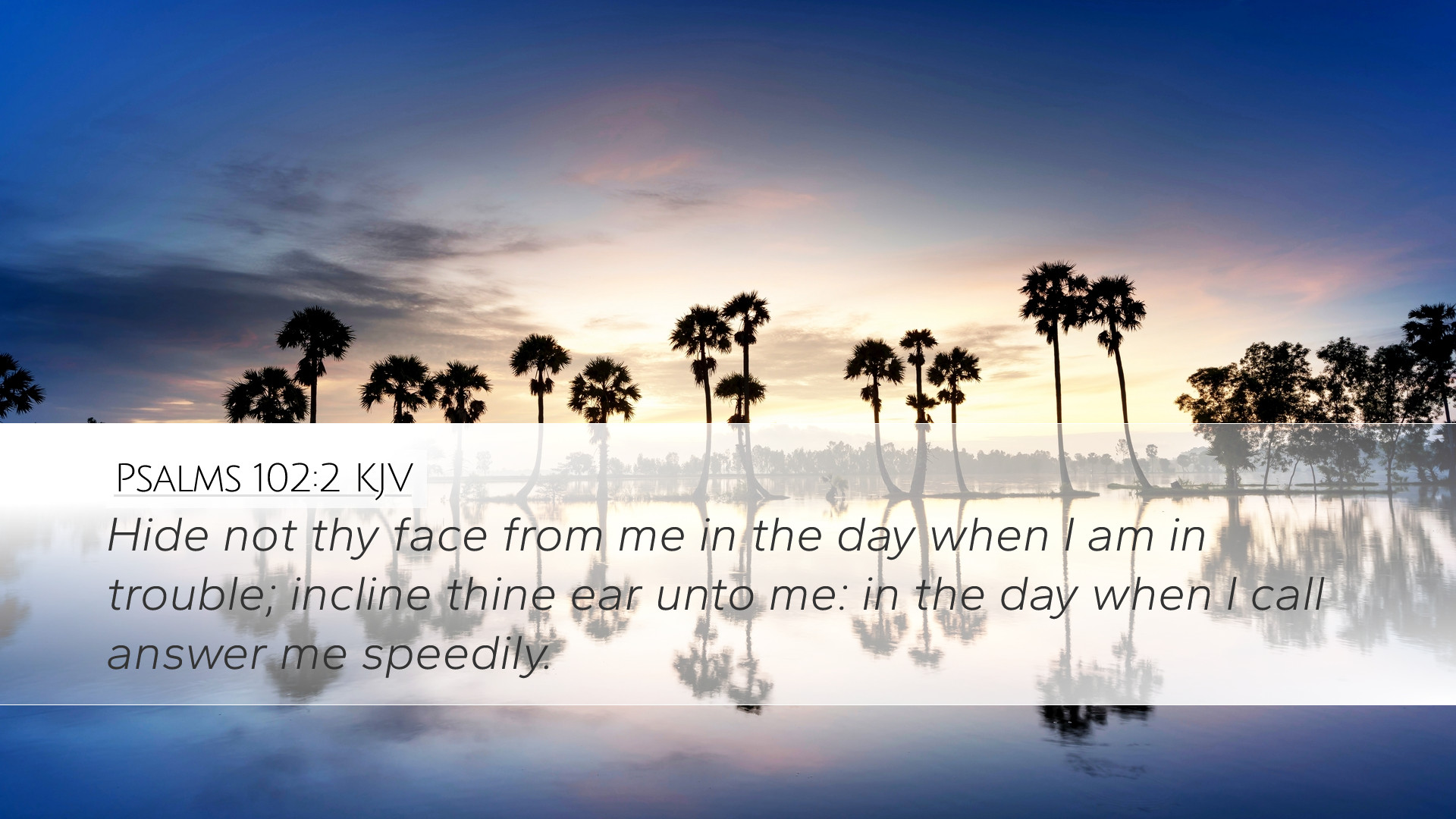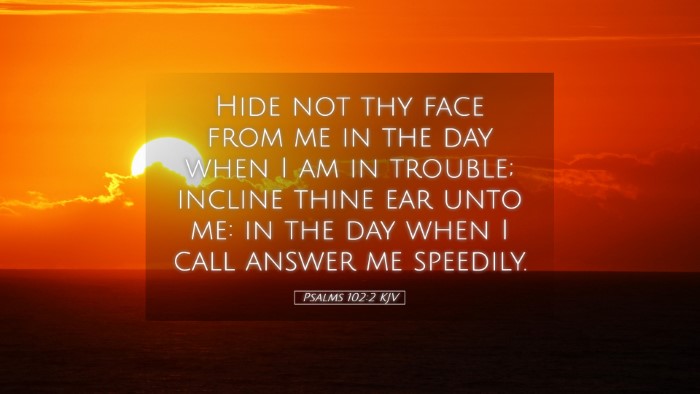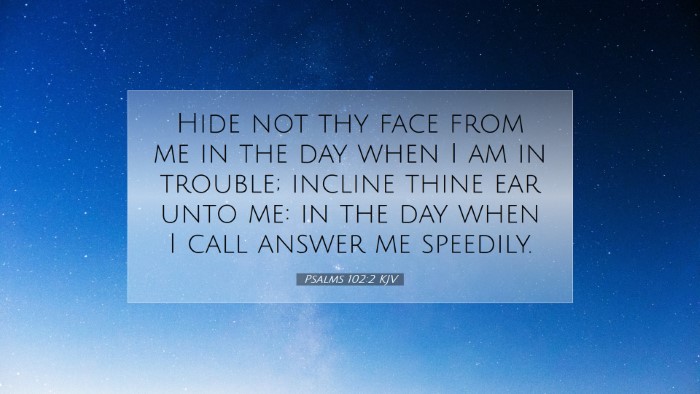Psalms 102:2 - A Deep Dive into the Text
Text of the Verse: "Hide not thy face from me in the day when I am in trouble; incline thine ear unto me: in the day when I call, answer me speedily."
Contextual Analysis
The Book of Psalms is a profound collection of prayers, hymns, and poetic expressions of faith. Psalms 102 is identified as a penitential psalm, rich in emotional depth and spiritual insight. Written during a time of sorrow and affliction, the psalm reflects the soul’s desperate cry for God’s attention and mercy.
Commentary Insights
Matthew Henry's Commentary
Matthew Henry focuses on the themes of earnestness and urgency in the psalmist's plea. He notes that the cry for God’s face not to be hidden indicates a deep awareness of one's need for divine presence. Henry elucidates the significance of God's "face" as symbolic of His favor and relational closeness, suggesting that in times of trouble, the believer's greatest fear is to feel abandoned by God.
The phrase "incline thine ear unto me" emphasizes the plea for divine attentiveness. According to Henry, this also shows the psalmist's humble attitude, recognizing that God does not owe him an audience yet pleading earnestly for it. It is a reflection of profound faith amid distress.
Albert Barnes' Notes
Albert Barnes elaborates on the keen sense of urgency and desperation inherent in the request for a prompt response from God. Barnes highlights the phrase "answer me speedily," arguing that it reflects a natural human longing for immediate divine intervention in times of crisis.
He suggests that the psalmist’s situation is one of intense suffering, both physically and spiritually. In this context, the entreaty to God is not just about physical rescue but also about the restoration of hope and peace in the believer's heart. Barnes positions the psalm as a model of how believers can approach God in their own times of need, showcasing a balance between fervent supplication and genuine faith.
Adam Clarke's Commentary
Adam Clarke offers a thorough examination of the text and its implications for personal faith. Clarke emphasizes the significance of God's face not being hidden as a demonstration of His grace. He reflects on the distress of the psalmist, who articulates a deep longing for God’s presence during a time of affliction that may lead to despair. Clarke also contextualizes the verse, positing that many believers can relate to periods of spiritual silence from God.
Moreover, Clarke identifies the recurring theme of prayer throughout the psalm, suggesting that all who find themselves in trouble can adopt a similar posture of earnest prayer, inviting God into their struggles. He illustrates the passage as not merely a personal lament but as a communal expression that resonates with anyone suffering a similar plight.
Theological Implications
The plea found in Psalms 102:2 serves as a reminder of the nature of human suffering and the essential reliance on God. The text invites theological reflection on divine responsiveness and the believer's role in seeking God's aid.
- Divine Presence: The fear of God's absence in distress points towards a broader theological exploration of what it means to experience the 'hiddenness' of God.
- The Nature of Prayer: The contrast between silence and the desire for a speedy divine response underscores the relational dynamics between humanity and God, emphasizing prayer as both an expression of need and a tool for intimacy with the divine.
- Faith Amid Trouble: The act of calling out to God in trouble encapsulates the essence of faith—the belief that God hears and responds to our pleas, reinforcing the idea of trust even in adversity.
Application for Pastors and Theologians
For pastors and theologians, Psalms 102:2 serves as a powerful reminder of pastoral care in times of suffering. It challenges spiritual leaders to provide avenues for petition and intercession for their congregants. The verse can also inspire sermons emphasizing the importance of turning to God in distress.
- Encouraging Prayer Practices: The urgency in the psalm could stimulate teachings on the necessity and value of persistent prayer in community worship.
- Providing Comfort: Pastoral applications can include emphasizing God’s ever-present help, promoting assurance that even in silence, God’s presence is near.
- Modeling Vulnerability: Pastors may use the psalmist's honesty as a model for expressing their struggles and dependence on God, fostering an environment where congregants feel safe to voice their own troubles.
Conclusion
Psalms 102:2 encapsulates the essence of seeking God's face in tumultuous times. The combined insights from Matthew Henry, Albert Barnes, and Adam Clarke provide a rich tapestry of understanding around this profound verse, emphasizing human desperation, divine grace, and the mutual relationship embedded in prayer. As modern-day believers reflect on this plea, they find both encouragement and a model for their own spiritual journeys, reminding them that even in their darkest hours, a heartfelt cry for God’s presence is always met with an invitation to wait upon Him.


